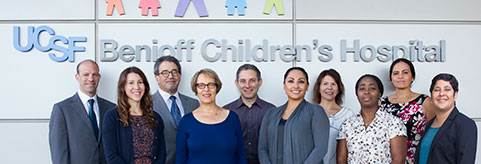Beckwith-Wiedemann Syndrome (BWS)
Beckwith-Wiedemann syndrome (BWS) is a growth disorder that's congenital, or present from birth. BWS is variable, meaning not all children have all the physical characteristics of the syndrome. Characteristics can include:
- Large tongue
- Large body or asymmetrical body growth
- Incomplete closure of the abdominal wall
- Low blood sugar, called hypoglycemia
- Increased frequency of tumors in the liver or kidneys
- Large lower jaw, very prominent eyes and a small midface
Many children with BWS have a genetic abnormality on chromosome number 11. In some cases, however, no cause for the syndrome can be found.
A pediatrician or a medical geneticist — a doctor specializing in genetic conditions — may diagnose Beckwith-Wiedemann based on a physical examination.
Treatment varies from child to child, depending on what characteristics the baby has and how severe they are. Treatments may include:
- In newborns, treatment for low blood sugar, or hypoglycemia, is important to reduce the risk of central nervous system complications, which can result from insufficient nutrition to the brain.
- Newborns with defects in the abdominal wall will have the defect repaired.
- Infants with an insufficient airway (due to a large tongue) may need a breathing tube.
- Since large tongues can interfere with feeding, some children may need to be fed with special nipples or given tube feedings.
- Children should be screened for tumors, using abdominal ultrasound and serum alpha fetoprotein (AFP), every three months until 8 years of age, and tumors should be treated as needed.
- Children with very enlarged tongues may benefit from surgery to reduce the size of the tongue at 2 to 4 years of age. This procedure can lead to improved feeding and speech.
- Some children benefit from speech therapy.
- Surgery may be performed during puberty to equalize different leg lengths. Surgery may help with facial growth differences as well; the age when these surgeries are performed depends on the child's specific case.
- Orthodontic treatment is usually needed in adolescence.
Reviewed by health care specialists at UCSF Benioff Children's Hospital.


